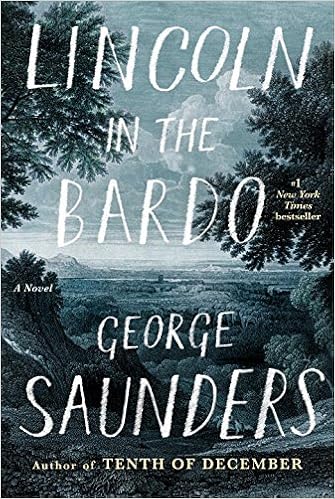 It took me two weeks to read Lincoln in the Bardo. I kept trying to fit it into my commute, reading snatches of it on the bus and subway, and constantly puzzling over whether I was actually enjoying this novel or was thoroughly mystified by it. However, when I read the final chapters this weekend, I realized this book was a masterpiece.
It took me two weeks to read Lincoln in the Bardo. I kept trying to fit it into my commute, reading snatches of it on the bus and subway, and constantly puzzling over whether I was actually enjoying this novel or was thoroughly mystified by it. However, when I read the final chapters this weekend, I realized this book was a masterpiece.I already made my love for George Saunders' short stories clear when I reviewed Tenth of December three years ago. At the time, I was astonished at how this man could pack an entire world into a few brief pages and build a complete history with some truly bewitching prose. However, a novel is a very different proposition, and part of my difficulty with getting into Lincoln in the Bardo stemmed from the fact that while it is meant to be one story, it often felt like a lot of disparate short stories woven into one narrative thread. This was initially frustrating, but watching it coalesce into a glorious whole was a pretty extraordinary literary experience.
The book is set in a cemetery and tells the story of the night following the death of Abraham Lincoln's young son, William. It contains snippets of actual historical information collated from various first-hand witnesses of the President's grief. But the majority of the story is told by the ghosts that are prowling around the cemetery, the poor souls who are stuck in Purgatory because of their stubborn insistence to remain on earth and deny their deaths. If that sounds bizarre, believe me it is, and it takes a lot of getting used to. But eventually Roger Bevins III, Hans Vollmann, and the Reverend Everly Thomas feel like old friends, and as they slowly let bits of their history slip out, you understand what it is they are clinging to from their past lives, but why it is more important for them to move on.
The book is ultimately a meditation on death and grief, which is not my first choice of literary fare. However, it deploys its wisdom cunningly, masking its true colors through the funny and profane asides of the multiple ghosts who are trying to figure out what to do with Willie Lincoln and his grieving father. Which brings me to the final chapters. That is when the book truly becomes a story about Abraham Lincoln, the ordinary man and heartbroken father, who will learn from this moment and go on to lead a nation during a bloody Civil War. It's not like we don't know Lincoln was a great man, but by choosing to focus on this devastating period in Lincoln's life, Saunders captures the fragility and raw humanness that fueled much of his greatness. When the ghosts of black slaves enter the narrative, you start to realize how cleverly Saunders has sucked you into this world and given you a valuable history lesson under the guise of fantastical fiction.
Lincoln in the Bardo is a subtle book. Every sentence is crafted with Saunders' trademark flair, alternating between hilarious and heartbreaking. It is certainly not an easy book to read, and there are long stretches that meander off into tangents and concern characters that don't really seem worthwhile. But stick with it. Because despite the weird territory it strays into, it ends with a moving profundity that makes the journey worthwhile.
No comments:
Post a Comment